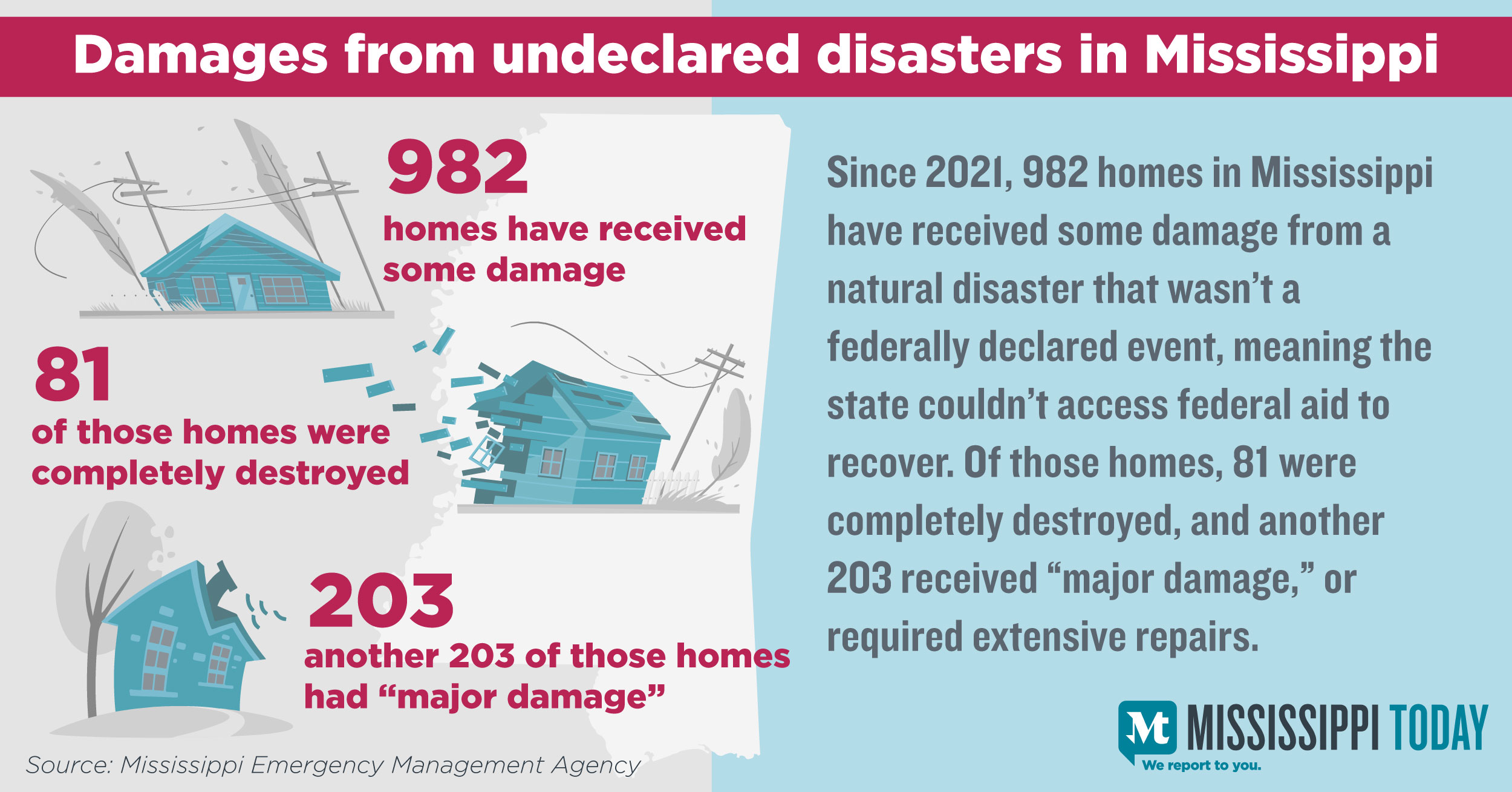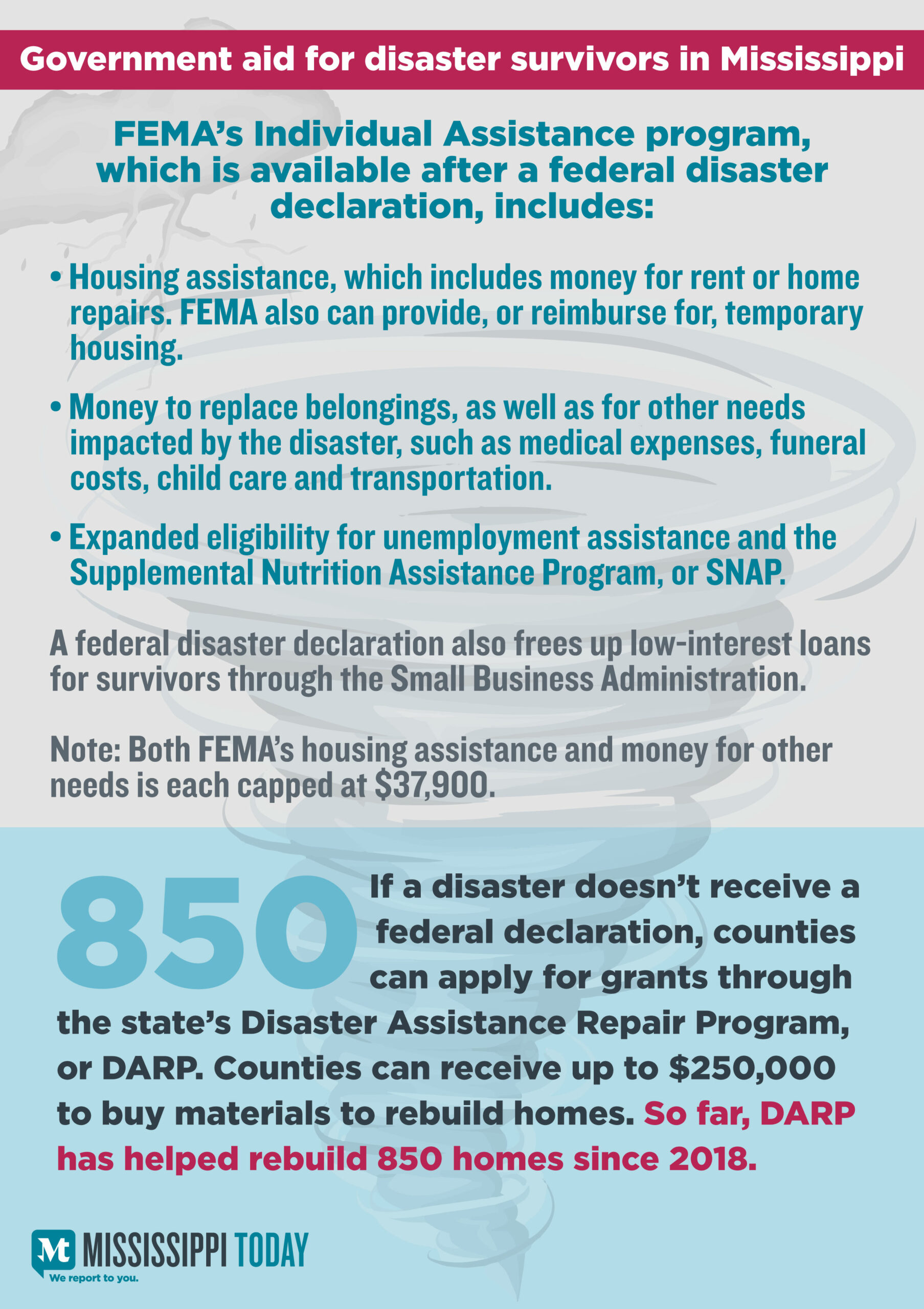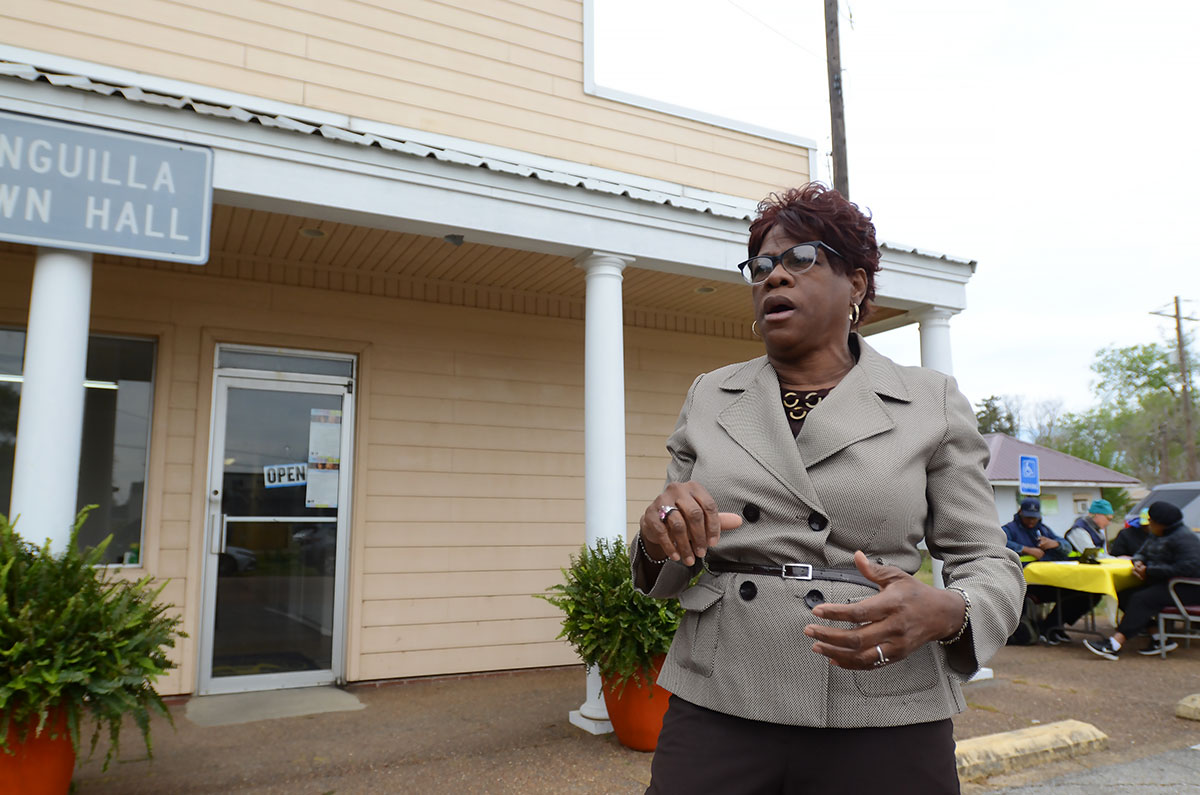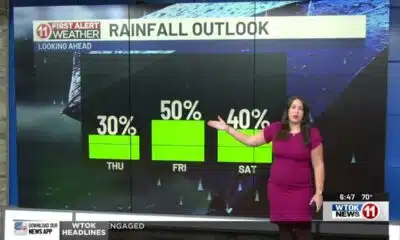Mississippi Today
When disasters are deemed too small, rural Mississippi struggles to recover
Under a mystic blend of pink lightning and green sky, Victoria Jackson called her daughter in a panic, warning her of the news: A tornado was on a path towards Rolling Fork.
Her daughter was working that March night at Chuck’s Dairy Bar, a staple of the small, south Delta town. Along with some customers, Jackson’s daughter, Natasha, nestled into one of the coolers in the restaurant.
Hours later, once the storm blew by, Jackson headed to find her daughter, navigating through debris. She found Natasha shaking, in tears. While the tornado tore the rest of Chuck’s into shreds, the cooler and those inside it were safe.
“I thank God that I called her and told her to get down,” Jackson told Mississippi Today.
The tornado killed 14 people in Sharkey County, and left Rolling Fork with little resemblance of its prior self. While the Jacksons didn’t lose anyone or anything that night, the reason they were in Rolling Fork in the first place is because, three months prior, they lost everything.

The first tornado the Jacksons survived wiped away their homes last December, tearing up a trailer park where they lived in Anguilla. Victoria, her sister, aunt, cousin and everyone in their families lost their homes, among five total that were destroyed. About 20 members of the family had to relocate a few miles down Highway 61 to a motel in Rolling Fork. Many of them, including Victoria, are still there.
As is often the case for rural disaster survivors, the damages they endured were too small to trigger crucial federal aid. Victoria didn’t have home insurance and lost her job after the storm. Now, nearly six months later, her family hasn’t seen a cent of government disaster aid, and are instead counting on donations to put them in a real home again.
Disaster recovery is already an often difficult and drawn-out process. But for rural, poor towns like Anguilla, a town of 496 people, it’s even tougher.
When people think about disaster recovery, they often think of “FEMA” – the Federal Emergency Management Agency, the national hub of government disaster aid. In reality, though, a vast majority of the country’s disasters don’t receive any FEMA money. They’re what experts call “undeclared” events.
“If you were to aggregate all the losses tied to undeclared disasters, they actually are more costly than typically declared disasters,” said Gavin Smith, a professor of Landscape Architecture and Environmental Planning at North Carolina State University who has helped lead recovery efforts in multiple states.

In Mississippi, nearly a thousand homes have been damaged in undeclared disasters in just the last two years, state records show.
FEMA aid, which comes when the president signs a disaster declaration, is reserved for the larger disasters that leave states needing additional resources. But when a disaster doesn’t meet that threshold, most states, including Mississippi, can’t replicate the kinds of services FEMA can offer.
The programs states receive after a federal declaration include: paying for public infrastructure repairs, putting people in temporary housing, sending direct payments to survivors, expanding safety net programs like food stamps and uninsurance benefits, among others.
Since more often than not, FEMA money is unavailable, many disaster survivors rely on their home insurance to pay for repairs.
But low-income, uninsured families like the Jacksons have to instead depend on the slow, complex network of volunteers and charities. Nonprofits and national religious groups help struggling communities recover all over the country, collecting donations to help rebuild homes, and providing otherwise costly labor for free. But that process takes time.
“If they’re back and recovered within six months, that is like warp speed for these organizations,” said Michelle Annette Meyer, the director of the Hazard Reduction & Recovery Center at Texas A&M University. “At best, they’re looking at a year-long process to get the donations in, confirm the paperwork, get the volunteers and get the materials donated.”
For Sharkey County, where Anguilla and Rolling Fork are, the nonprofit Delta Force handles disaster recovery, finding new homes for survivors after undeclared events. Delta Force’s chairman, Martha Bray, wouldn’t comment on specific cases for privacy reasons, only saying that they’re waiting for enough donations to come in to buy new mobile homes for the Jacksons.
“It’s going to be a long process, that’s all we hear,” Victoria Jackson said.

Last December, just before Christmas and after the tornado destroyed her home, Jackson lost her retail job at a local shop. She said her boss didn’t let her come back despite giving her time off after the storm, and then listed her as having quit, which blocked her from unemployment benefits.
Now, she’s sharing a two-bed room with her husband and six kids at the Rolling Fork Motel.
Jackson said she received $2,500 in initial donations from local churches and charities. But expenses like food, gas, laundry, and taking care of her children quickly dried that money up. Since her daughter Natasha lost her job at Chuck’s Dairy Bar, the family’s relying on her husband’s truck-driving job to keep them afloat.
After the December tornado, Anguilla Mayor Jan Pearson reached out to state and U.S. representatives, hoping that they could appeal for government assistance. The traces of the tornado were widespread in the small town, damaging businesses and even blowing the roof off the town’s middle school, forcing students to relocate.
“I wrote all of them a letter,” Pearson said. “However, to no avail. We did not get anything.”
County officials, Pearson said, told her the damages didn’t meet the threshold for federal assistance.
“I keep hearing we didn’t meet the threshold,” she said. “Well I asked somebody, ‘Will you tell me what the threshold is?’ No one could tell me what the threshold is.”

For Individual Assistance, the FEMA program that includes housing and other direct support for survivors, there is no set threshold, officials told Mississippi Today.
“It is kind of subjective,” FEMA spokesperson Mike Wade said.
FEMA weighs several factors, such as the degree of damages and the amount of uninsured losses, when deciding if a declaration is justified. The agency categorizes damages into several categories, ranging from “affected” to “destroyed.”
But to local and state officials, FEMA’s criteria is unclear.
In the summer of 2021, for instance, heavy rain flooded 284 homes in the Delta. While local officials pleaded for federal support, the state informed them that not enough of the homes received “major damage,” which FEMA defines as needing “extensive repairs.”
Last March, 33 tornadoes touched down in Mississippi, destroying 42 homes across a dozen counties. The state applied for a federal declaration, but was denied.
While there’s no set threshold, the Mississippi Emergency Management Agency estimated that at least 50 homes need major damage to earn a federal declaration.
But the damages from undeclared disasters in just the last couple years dwarf that number.
Since 2021, 982 homes in the state received some damage from an undeclared natural disaster, according to records from MEMA; 81 of those homes were completely destroyed, and another 203 received major damage.
“When you look at only one of (the undeclared disasters), the damage may be relatively small,” said Andrew Rumbach, a senior fellow at the Urban Institute whose research focuses on rural recovery efforts. “But when you add all those up across the state, it actually cumulatively could be much more important than some of those big events that do get that support.”
Anguilla has just 250 households, according to the Census. Sharkey County Supervisor Jesse Mason, who represents Anguilla, wondered how such a small place could reach the amount of damages that FEMA looks for.
“I don’t know what the magic number is,” Mason said. “I guess maybe it had to tear the whole town up.”

Rural areas have an especially hard time getting FEMA disaster aid, experts say. Mississippi was the fourth most rural state according to a 2010 Census survey, the latest with such data. Sharkey County, home to 3,488 people, is the second least populated county in the state. Neighboring Issaquena County is the first.
“The more rural you are and the more scattered your population and assets are, sometimes those kind of events are the ones that slip under the radar compared to the events where there’s media, for example, to immediately cover it, or there’s political pressure to immediately make declarations,” Rumbach said.
Mississippi has a program that sends money to counties after undeclared disasters. The Disaster Assistance Repair Program, or DARP, works with local nonprofits, and sends up to $250,000 for materials to rebuild homes. Meyer, the Texas A&M professor, said that’s more than what most states do after undeclared events.
Since 2018, DARP has helped rebuild 850 homes in 22 counties. But Sharkey County hasn’t applied for DARP funds to help the Anguilla survivors, and officials couldn't be reached to explain why.
Every county in the state has emergency management officials. But in Sharkey County, there are only two such employees, and both work part-time. Counties with lower tax bases and less capacity to do damage assessments struggle to make the case for disaster declarations, Rumbach said.
One of those two employees, Natalie Perkins, also runs the local weekly newspaper. After the Rolling Fork disaster, which President Joe Biden approved for federal aid, Perkins saw firsthand the difference a declaration makes.
“When you have a declared disaster, everyone comes out of the woodwork to help,” she said. “But when you have an undeclared (event), you don’t get the attention, you don’t get the donations, you don’t get the federal and state funding that you do in a declared disaster. That’s just the bottom line.”

On the morning of Mar. 29, five days after the tornado in Rolling Fork, which also damaged parts of Anguilla, Mayor Pearson scrambled to help FEMA officials set up a booth outside of the town hall.
Pearson sat down with Mississippi Today to talk about the December tornado, the one that displaced the Jacksons. She emphasized that she didn’t want to take away attention from what happened in Rolling Fork. But she couldn’t hold back frustration over the lack of help Victoria Jackson and her family received.
“These people just three months ago lost their homes,” the mayor said. “I can’t equate Rolling Fork with Anguilla. But come on now, people are people, humans are humans. The (Jacksons) left Anguilla and came to Rolling Fork. Now a tornado hit Rolling Fork. These people don’t have anything, and you’re telling them they can’t qualify (for FEMA aid)?”

At the motel, the Jacksons accused the owner of poor treatment, saying he recently raised their weekly rent to $400, and charges extra to wash their sheets. When reached for comment, the motel staff said the owner was out of the country and couldn’t comment. Meanwhile, the Jacksons don’t know how much longer they’ll be able to afford the room.
That Wednesday, while federal officials were in Anguilla, Victoria tried to apply for FEMA aid. They called back later, she said, telling her she’d been denied. While the agency won’t comment on specific cases, FEMA confirmed that aid wasn’t available for people in her situation.
“We just need the help that they’re giving other people,” Jackson said, wondering why she and her family had been left out. “Anguilla is Sharkey County, Rolling Fork is Sharkey County, so all this should be combined together, right? Help for everybody, right?”
This article first appeared on Mississippi Today and is republished here under a Creative Commons license.
Mississippi Today
Judge: Felony disenfranchisement a factor in ruling on Mississippi Supreme Court districts
The large number of Mississippians with voting rights stripped for life because they committed a disenfranchising felony was a significant factor in a federal judge determining that current state Supreme Court districts dilute Black voting strength.
U.S. District Judge Sharion Aycock, who was appointed to the federal bench by George W. Bush, last week ruled that Mississippi’s Supreme Court districts violate the federal Voting Rights Act and that the state cannot use the same maps in future elections.
Mississippi law establishes three Supreme Court districts, commonly referred to as the northern, central and southern districts. Voters elect three judges from each to the nine-member court. These districts have not been redrawn since 1987.
READ MORE: Mississippians ask U.S. Supreme court to strike state’s Jim Crow-era felony voting ban
The main district at issue in the case is the central district, which comprises many parts of the majority-Black Delta and the majority-Black Jackson Metro Area.
Several civil rights legal organizations filed a lawsuit on behalf of Black citizens, candidates, and elected officials, arguing that the central district does not provide Black voters with a realistic chance to elect a candidate of their choice.
The state defended the districts arguing the map allows a fair chance for Black candidates. Aycock sided with the plaintiffs and is allowing the Legislature to redraw the districts.
The attorney general’s office could appeal the ruling to the U.S. 5th Circuit Court of Appeals. A spokesperson for the office stated that the office is reviewing Aycock’s decision, but did not confirm whether the office plans to appeal.
In her ruling, Aycock cited the testimony of William Cooper, the plaintiff’s demographic and redistricting expert, who estimated that 56,000 felons were unable to vote statewide based on a review of court records from 1994 to 2017. He estimated 60% of those were determined to be Black Mississippians.
Cooper testified that the high number of people who were disenfranchised contributed to the Black voting age population falling below 50% in the central district.
Attorneys from Attorney General Lynn Fitch’s office defended the state. They disputed Cooper’s calculations, but Aycock rejected their arguments.
The AG’s office also said Aycock should not put much weight on the number of disenfranchised people because the U.S. Fifth Circuit Court of Appeals previously ruled that Mississippi’s disenfranchisement system doesn’t violate the Equal Protection Clause of the 14th Amendment.
Aycock, however, distinguished between the appellate court’s ruling that the system did not have racial discriminatory intent and the current issue of the practice having a racially discriminatory impact.
“Notably, though, that decision addressed only whether there was discriminatory intent as required to prove an Equal Protection claim,” Aycock wrote. “The Fifth Circuit did not conclude that Mississippi’s felon disenfranchisement laws have no racially disparate impact.”
Mississippi has one of the harshest disenfranchisement systems in the nation and a convoluted method for restoring voting rights to people.
Other than receiving a pardon from the governor, the only way for someone to regain their voting rights is if two-thirds of legislators from both chambers at the Capitol, the highest threshold in the Legislature, agree to restore their suffrage.
Lawmakers only consider about a dozen or so suffrage restoration bills during the session, and they’re typically among the last items lawmakers take up before they adjourn for the year.
Under the Mississippi Constitution, people convicted of a list of 10 types of felonies lose their voting rights for life. Opinions from the Mississippi Attorney General’s Office have since expanded the list of specific disenfranchising felonies to 23.
The practice of stripping voting rights away from people for life is a holdover from the Jim Crow era. The framers of the 1890 Mississippi Constitution believed Black people were most likely to commit certain crimes.
Leaders in the state House have attempted to overhaul the system, but none have gained any significant traction in both chambers at the Capitol.
Last year, House Constitution Chairman Price Wallace, a Republican from Mendenhall, advocated a constitutional amendment that would have removed nonviolent offenses from the list of disenfranchising felonies, but he never brought it up for a vote in the House.
Wallace and House Elections Chairman Noah Sanford, a Republican from Collins, are leading a study committee on Sept. 11 to explore reforms to the felony suffrage system and other voting legislation.
Wallace previously said on an episode of Mississippi Today’s “The Other Side” podcast that he believes the state should tackle the issue because one of his core values, part of his upbringing, is giving people a second chance, especially once they’ve made up for a mistake.
“This issue is not a Republican or Democratic issue,” Wallace said. “It allows a woman or a man, whatever the case may be, the opportunity to have their voice heard in their local elections. Like I said, they’re out there working. They’re paying taxes just like you and me. And yet they can’t have a decision in who represents them in their local government.”
This article first appeared on Mississippi Today and is republished here under a Creative Commons Attribution-NoDerivatives 4.0 International License.
The post Judge: Felony disenfranchisement a factor in ruling on Mississippi Supreme Court districts appeared first on mississippitoday.org
Note: The following A.I. based commentary is not part of the original article, reproduced above, but is offered in the hopes that it will promote greater media literacy and critical thinking, by making any potential bias more visible to the reader –Staff Editor.
Political Bias Rating: Center-Left
This article presents a focus on voting rights and racial justice issues, highlighting the impact of felony disenfranchisement on Black voters in Mississippi. It emphasizes civil rights concerns and critiques longstanding policies rooted in the Jim Crow era, which aligns with center-left perspectives advocating for expanded voting access and systemic reform. The coverage is factual and includes viewpoints from multiple sides, but the framing and emphasis on racial disparities and voting rights restoration suggest a center-left leaning.
Mississippi Today
Jackson police chief steps down to take another job, national search to come
Jackson Police Department Chief Joseph Wade told the mayor last week he was choosing to retire after 29 years of service and two years at the helm of the force. Wade said he’d been given another job opportunity, which has yet to be announced.
His last day is Sept. 5.
Mayor John Horhn said he told Wade the officer would be crazy not to take the job — one that comes with less stress and more pay.
“His wife has been on his back, his blood pressure has been up,” Horhn said during Tuesday’s City Council meeting. “He has done a commendable job.”
Wade became chief during a period in which Jackson was called the murder capital of America. Under his tenure, Wade said crime has fallen markedly, including a roughly 45% reduction in homicides so far this year compared to the same period in 2024, the Clarion Ledger reported. He said he’s also increased JPD’s force by 37, for a total of 258 officers.
Wade said his biggest accomplishment is reestablishing trust. “We are no longer the laughing stock of the law enforcement community,” he said.
The chief’s departure comes less than two months after Horhn took office, replacing former Mayor Chokwe Antar Lumumba who originally appointed Wade, and on the heels of a spate of shootings that Wade said were driven by gangs of young men.
“I have received so many calls from the community: ‘Chief, please don’t leave us,'” Wade told the crowd in council chambers.
But Wade said he “would rather leave prematurely than overstay my welcome,” adding that the average tenure of a police chief is 2.5 years.
Wade said that last year he stood next to Jackson Councilman Kenny Stokes and told the media he was going to cut crime in half, “And what did I do? Cut it in half,” he said.
“What I’ve seen in our community in some situations is people want police, but they don’t want to be policed,” Wade said.
Hinds County Sheriff Tyree Jones will serve as interim police chief until the administration finds a replacement. Jones said he has not finalized a contract with the city, responding to a question about whether he will draw a salary from both agencies.
“I could think of no one better than the sheriff of Hinds County,” Horhn said, adding that the appointment is temporary.
Jones said during the meeting that his responsibility as sheriff will continue uninterrupted and that his goal within JPD is to ensure continued professionalism in the department.
“I extend my heartfelt gratitude to my dear friend and retired police chief Joe Wade,” Jones said. “Again, let me be clear, I have no aspirations to permanently hold the position.”
Horhn said there is precedence for the dual role that “Chief Sheriff Jones is about to embark upon,” citing former mayor Frank Melton’s hiring of Sheriff Malcolm McMillin.
The city has enlisted help from former U.S. Marshal George White and the former chief of the Mississippi Highway Patrol, Col. Charles Haynes, to lead the Law Enforcement Task Force that will conduct a nationwide search to fill the position. The administration expects that to take between 30 and 60 days, according to a city press release.
The release said the task force will also examine safety challenges in Jackson more broadly, such as youth crime, drug crimes, departmental needs and interagency coordination.
“I am grateful that Marshal White and Col. Haynes have agreed to lead this important effort. Their breadth of experience, commitment to public safety and deep understanding of law enforcement challenges will ensure the task force conducts a rigorous search for our next chief,” said Horhn. “I am confident they will help shape solutions that address the evolving needs of Jackson.”
The city said it would soon release details about the opportunity for the public to offer input on the process.
“Hinds County is all in for whatever we have to do to make Jackson and Hinds County the safest it can be,” Hinds County Supervisors President Robert Graham said during the meeting.
Wade, who hails from nearby Terry, graduated from JPD’s 23rd recruit class in 1995, rising from a police recruit and hitting every rung of the ladder on his way to chief. “I was homegrown,” he said.
Wade said he received “an amazing offer in a private sector at an amazing organization. Don’t ask me where. That will be released at the appropriate time.”
This story may be updated.
This article first appeared on Mississippi Today and is republished here under a Creative Commons Attribution-NoDerivatives 4.0 International License.
The post Jackson police chief steps down to take another job, national search to come appeared first on mississippitoday.org
Note: The following A.I. based commentary is not part of the original article, reproduced above, but is offered in the hopes that it will promote greater media literacy and critical thinking, by making any potential bias more visible to the reader –Staff Editor.
Political Bias Rating: Centrist
The article presents a straightforward news report on the resignation of a police chief, focusing on facts, quotes from officials, and crime statistics without evident ideological framing. It covers perspectives from multiple local government figures and avoids partisan language, reflecting a neutral, balanced tone typical of centrist reporting.
Mississippi Today
Bluesky blocks access in Mississippi, citing free speech and privacy concerns over state law
Mississippians can no longer access the Bluesky app after the social media platform blocked access to users in the state.
Bluesky said on Friday that it made the decision after the U.S. Supreme Court declined for now to block a Mississippi state law that the platform said limits free expression, invades people’s privacy and unfairly targets smaller social media companies. The state law, passed in 2024, requires users of websites and other digital services to verify their age.
“The Supreme Court’s recent decision leaves us facing a hard reality: comply with Mississippi’s age assurance law—and make every Mississippi Bluesky user hand over sensitive personal information and undergo age checks to access the site—or risk massive fines,” the company wrote in a statement. “The law would also require us to identify and track which users are children, unlike our approach in other regions. We think this law creates challenges that go beyond its child safety goals, and creates significant barriers that limit free speech and disproportionately harm smaller platforms and emerging technologies.”
Mississippi Attorney General Lynn Fitch, whose office defended the law, told the justices that age verification could help protect young people from “sexual abuse, trafficking, physical violence, sextortion and more,” activities that the First Amendment does not protect.
The age verification law added Mississippi to a list of Republican-led states where similar legal challenges are playing out.
NetChoice is challenging laws passed in Mississippi and other states that require social media users to verify their ages, and asked the Supreme Court to keep the measure on hold while a lawsuit plays out.
That came after a federal judge prevented the 2024 law from taking effect. But a three-judge panel of the 5th Circuit U.S. Court of Appeals ruled in July that the law could be enforced while the lawsuit proceeds.
On Aug. 14, the Supreme Court rejected an emergency appeal from a tech industry group representing major platforms such as Facebook, X and YouTube.
There were no noted dissents from the brief, unsigned order. Justice Brett Kavanaugh wrote that there’s a good chance NetChoice will eventually succeed in showing that the law is unconstitutional, but hadn’t shown it must be blocked while the lawsuit unfolds.
Bluesky grew after the 2024 presidential election. Many users of X, which is owned by Elon Musk, retreated from the platform in response to the billionaire’s strong support of Donald Trump.
In Bluesky’s statement explaining its decision to block access in Mississippi, the company said age verification systems “require substantial infrastructure and developer time investments, complex privacy protections, and ongoing compliance monitoring — costs that can easily overwhelm smaller providers.”
“This dynamic entrenches existing big tech platforms while stifling the innovation and competition that benefits users,” the company added.
Bluesky said it did follow other digital safety regulations, such as the United Kingdom’s Online Safety Act. Under that statute, age checks are required only for accessing certain content and features, and Bluesky does not track which users are under 18, the platform said:
“Mississippi’s law, by contrast, would block everyone from accessing the site—teens and adults—unless they hand over sensitive information, and once they do, the law in Mississippi requires Bluesky to keep track of which users are children.”
The Mississippi law, authored by Rep. Jill Ford, a Republican from Madison, is called the “Walker Montgomery Protecting Children Online Act,” named after a Mississippi teen who reportedly committed suicide after an overseas online predator threatened to blackmail him.
The Associated Press contributed to this report
This article first appeared on Mississippi Today and is republished here under a Creative Commons Attribution-NoDerivatives 4.0 International License.
The post Bluesky blocks access in Mississippi, citing free speech and privacy concerns over state law appeared first on mississippitoday.org
Note: The following A.I. based commentary is not part of the original article, reproduced above, but is offered in the hopes that it will promote greater media literacy and critical thinking, by making any potential bias more visible to the reader –Staff Editor.
Political Bias Rating: Center-Left
The content presents a perspective that emphasizes concerns about free speech, privacy, and the impact of government regulation on smaller tech companies, which aligns with a more progressive or liberal viewpoint on digital rights and corporate regulation. It critiques a Republican-led state law as potentially overreaching and harmful to innovation, while also acknowledging the law’s intent to protect children. The balanced presentation of both sides, with a slight emphasis on the tech platform’s viewpoint and civil liberties, suggests a center-left bias.
-
News from the South - Texas News Feed5 days ago
DEA agents uncover 'torture chamber,' buried drugs and bones at Kentucky home
-
News from the South - Missouri News Feed7 days ago
Missouri settles lawsuit over prison isolation policies for people with HIV
-
News from the South - Texas News Feed3 days ago
Racism Wrapped in Rural Warmth
-
The Center Square6 days ago
Georgia ICE arrests up 367 percent from 2021, making for ‘safer streets, open jobs | Georgia
-
Local News6 days ago
Florida must stop expanding ‘Alligator Alcatraz’ immigration center, judge says
-
News from the South - Kentucky News Feed6 days ago
Quintissa Peake, ‘sickle cell warrior’ and champion for blood donation, dies at 44
-
Our Mississippi Home6 days ago
The Dixon: Writing a New Story for Main Street in Natchez
-
News from the South - Oklahoma News Feed6 days ago
Tom Cole’s Powerful Spot on the Appropriations Committee Is Motivating Him to Stay in Congress
















































